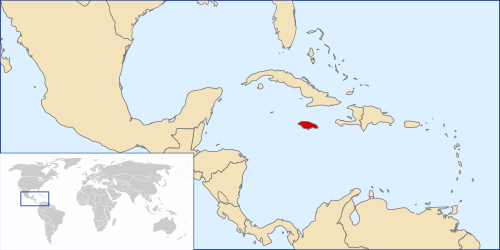 Jamaica (pronounced /dʒəˈmeɪkə/) is an island nation of the Greater Antilles, 234 kilometres (145 mi) in length and as much as 80 kilometres (50 mi) in width, amounting to 11,100 square kilometres (4,300 sq mi). It is situated in the Caribbean Sea, about 145 kilometres (90 mi) south of Cuba, and 190 kilometres (120 mi) west of Hispaniola, the island harboring the nation-states Haiti and the Dominican Republic. Its indigenous Arawakan-speaking Taíno inhabitants named the island Xaymaca, meaning the “Land of Wood and Water,” or the “Land of Springs.”
Jamaica (pronounced /dʒəˈmeɪkə/) is an island nation of the Greater Antilles, 234 kilometres (145 mi) in length and as much as 80 kilometres (50 mi) in width, amounting to 11,100 square kilometres (4,300 sq mi). It is situated in the Caribbean Sea, about 145 kilometres (90 mi) south of Cuba, and 190 kilometres (120 mi) west of Hispaniola, the island harboring the nation-states Haiti and the Dominican Republic. Its indigenous Arawakan-speaking Taíno inhabitants named the island Xaymaca, meaning the “Land of Wood and Water,” or the “Land of Springs.”
Once a Spanish possession known as Santiago, in 1655 it became an English, and later a British colony, known as “Jamaica.” It achieved full independence in 1962. With 2.8 million people, it is the third most populous anglophone country in the Americas, after the United States and Canada. It remains a Commonwealth realm with Queen Elizabeth II as Head of State. Kingston is the largest city in Jamaica and the country’s capital.
The island was settled by Arawak Indians c. 600 CE. It was sighted by Christopher Columbus in 1494; Spain colonized it in the early 16th century but neglected it because it lacked gold reserves. Britain gained control in 1655, and by the end of the 18th century Jamaica had become a prized colonial possession because of the volume of sugar produced by slave labourers. Slavery was abolished in the late 1830s, and the plantation system collapsed. Jamaica gained full internal self-government in 1959 and became an independent country within the British Commonwealth in 1962. In the late 20th century the government, led by Michael Manley, nationalized many businesses.
Though a small nation, Jamaica is rich in culture and has a strong global presence. The musical genres reggae, ska, mento, rocksteady, dub, and, more recently, dancehall and ragga all originated in the island’s vibrant, popular urban recording industry. Jamaica also played an important role in the development of punk rock, through reggae and ska. Reggae has also influenced American rap music, as they both share their roots as rhythmic, African styles of music. Some rappers, such as The Notorious B.I.G. and Heavy D, are of Jamaican descent. Internationally known reggae musician Bob Marley was born in Jamaica and is very respected there.
Jamaica’s most important export crop is sugarcane, from which rum and molasses are also made. The nation’s other agricultural exports include the famed Blue Mt. coffee, bananas, citrus fruits, and yams. Most of these crops are grown on large plantations. Small farms also produce ginger, cocoa, pimento, ackee, chickens, and goats. Mining is a major source of wealth; since large, easily accessible deposits of bauxite were discovered in 1942, Jamaica has become one of the world’s leading suppliers of this ore. Along with the alumina made from it, bauxite accounts for almost half of Jamaica’s foreign exchange.
Tourism, centered on the north coast, is the biggest earner of exchange. Among Jamaica’s internationally known resort areas are Montego Bay, Ocho Rios, and Negril. Clothing constitutes the chief export item of the manufacturing sector. Jamaica’s other industries (mainly concentrated in the Kingston area) include oil refining, sugar and tobacco processing, flour milling, and the production of rum, metal, paper, chemicals, and telecommunications equipment. Since the late 1960s industry has generated a greater share of the national income than agriculture. Remittances from Jamaicans working abroad are also a major source of income. The United States and Canada, Jamaica’s top trading partners, also provide much-needed capital for economic development.
Notes from Wikipedia and Answers.com









